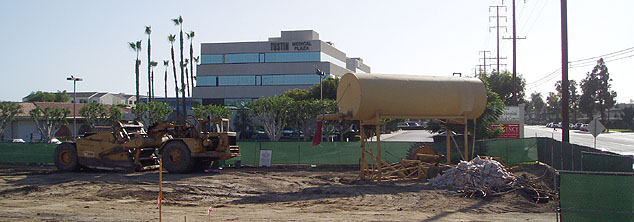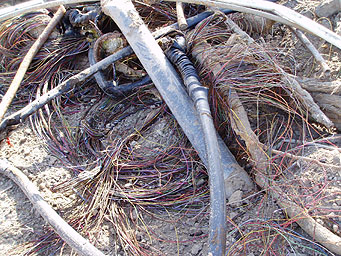HDSCS Supports Tustin Hospital
During 16-Hour Telephone Failure


In the late afternoon of October 6, 2004, construction equipment accidentally excavated two trunk lines serving Tustin Hospital and Medical Center (THMC) in the city of Tustin, California. A 400-pair cable was completely severed and an adjacent 200-pair cable was damaged. Suddenly, all telephones within the 177-bed facility could not place or receive outside calls. The accident also took down the hospital's links to the community for e-mail, fax, fire alarms and paging.
Following established procedures, Rob McFarland, the hospital's Director of Safety, used his Call-Up List to directly notify the Orange County Hospital Disaster Support Communication System (HDSCS) at 5:28 PM. April Moell received the call and sent seven members to the facility. The Amateur Radio response was rapid, considering that the activation occurred at the peak of rush hour and the hospital is located near the intersection of the crowded 55 and 5 freeways.
The HDSCS first responders met with Mr. McFarland, who requested that they deploy to the emergency Command Post, switchboard, Medical/Surgical unit, Pediatric unit, Intensive Care Unit, and the new Emergency Department. Meanwhile, WA6OPS and two other base station operators prepared to make and receive phone calls in behalf of the THMC. Message traffic began to flow immediately after the operators got on station, as hospital staff members re-established links with their patients' physicians on the outside.
 When phone company workers stated that repairs would take at least six hours, HDSCS began calling more members to provide relief to the first responders. By 9:30 AM the next morning, when the last telephone pair was spliced and the outage was declared to be over, four staggered shifts of HDSCS operators had worked within the facility. Twenty-four HDSCS members participated in all.
When phone company workers stated that repairs would take at least six hours, HDSCS began calling more members to provide relief to the first responders. By 9:30 AM the next morning, when the last telephone pair was spliced and the outage was declared to be over, four staggered shifts of HDSCS operators had worked within the facility. Twenty-four HDSCS members participated in all.
"Although we have participated in numerous drills at THMC in the past, some newer employees were unfamiliar with Amateur Radio's capability," says WA6OPS. "They seemed amazed that HDSCS support has been completely free of cost to them. We know their communications needs, bring all our own equipment and don't require any expenditure by any of the medical facilities we support. It's a true community service."
Mr. McFarland was already well aware of HDSCS because of our service at his previous facility. In October 1993, he was Supervisor of Safety and Security at Mission Hospital Regional Medical Center when a wildfire raced down Laguna Canyon and telephone lines became overloaded. HDSCS members kept his and three other affected hospitals linked with the remainder of the county through the night. After that disaster, he wrote in a letter of commendation: "From the beginning, your assistance was superb. Anticipating our need for supplemental communications, you dispatched volunteer radio operators before we even asked. Your crew conscientiously kept us up to date on news from the county and other hospitals. As a result, we felt more confident in our decisions and the completeness of our contingency plans. Despite closed roads and gridlock traffic, your team came through."
This was the 85th activation for a hospital communications failure in the history of HDSCS and the fifth emergency activation in 2004. It was the longest duration HDSCS callout since the Laguna flood of January 1995. It involved more HDSCS members than any activation since 28 were deployed for the April 2002 Metrolink train crash in Placentia, CA. It required the most members of any single-hospital incident since 32 responded to a 23-hour telephone failure at St. Jude Hospital in November 1989.
Responders to THMC were:
Paul Broden K6MHD
Scott Carpenter KØSMC
Bruce Chappell KE6TSM
Louie DeArman K6SM
Galel Fajardo KB6MOH
Galel Fajardo Jr. KD6AYP
Tom Gaccione WB2LRH
Craig Johnson NØCCJ
Dennis Kidder WA6NIA
Jeff Kotrys KE6HER
Fred Lochner WA6FRA
Dave Mofford W7KTS
Jon Schaffer W6UFS
Marshall Shipley KG6SKD
Ken Simpson W6KOS
Clay Stearns KE6TZR
Jay Thompson W6JAY
Richard Thompson WA6NOL
Fred Wagner KQ6Q
Al Way KC6LNP
Net Controls and Base Station call handlers were:
Jean Creason KC6PPY
April Moell WA6OPS
Joe Moell KØOV
Cheryl Simpson KD6MWZ
In the photos: At top, the site of the construction accident next to Tustin Hospital Medical Center. Below that, torn telephone cable lies in a pile of construction rubble after the incident.

Go to the next activation report
Back to the HDSCS News Notes page
Back to the HDSCS home page
This page updated 22 March 2006